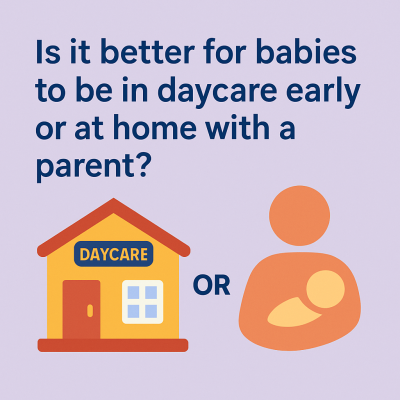Daycare vs. Staying Home: What’s Best for Babies?

Is daycare or staying home with a parent better for babies? Explore both sides of the debate—socialization, bonding, costs, and development—so you can make the best choice for your family. Let us know your opinion in our poll, and get THREE bonus entries for the chance to win a Free Baby Bottle Prize Pack!
The Big Question for Canadian Parents
One of the most common questions new parents face is whether to enroll their baby in daycare early or keep them at home with a parent. It’s a deeply personal decision, and opinions vary widely. Both options come with benefits and challenges, and what works for one family might not work for another.
Here’s a balanced look at both sides to help you think through your decision.
The Case for Daycare Early
1. Socialization and Peer Interaction
Daycare exposes babies and toddlers to peers early on, giving them opportunities to develop social skills, learn sharing, and adapt to group settings. Many parents feel this prepares children well for preschool and kindergarten.
2. Structured Routines
Daycare often follows a set daily schedule—naps, snacks, play, and activities. This structure can help babies and toddlers thrive and develop healthy habits.
3. Developmental Stimulation
Quality daycares incorporate age-appropriate activities like music, sensory play, and early learning exercises that encourage cognitive, motor, and language development.
4. Support for Working Parents
For parents who need or choose to work, daycare offers reliable childcare and allows them to maintain their careers. This can reduce financial stress, which benefits the whole family.
The Case for Staying Home with a Parent
1. Strong Parent-Child Bond
Staying home allows parents to spend more one-on-one time with their baby, strengthening attachment and building a secure emotional foundation.
2. Personalized Care
At home, care can be fully customized to the baby’s needs—whether that’s nap schedules, feeding preferences, or developmental pace—without the group setting compromises daycare sometimes requires.
3. Lower Exposure to Illness
Daycares, while wonderful for socialization, often mean more exposure to germs. Parents who keep babies home may experience fewer colds and illnesses in the first year or two.
4. Flexible Routine
Parents at home can follow their own schedule and adjust daily plans based on the baby’s mood, energy, and needs—something that can be harder to do in a group care environment.
Factors to Consider Before Deciding
Cost: Daycare can be expensive, but staying home may mean living on a single income.
Parent Well-Being: Some parents thrive at home, while others miss adult interaction or career fulfillment.
Baby’s Temperament: Some babies adapt easily to daycare environments; others may prefer quieter, familiar surroundings.
Availability of Quality Care: In some areas, finding a trusted daycare spot can be challenging.
The Bottom Line
There’s no universal “right” answer—just what’s right for your family. Whether you choose daycare, staying home, or a combination of both, babies benefit most from consistent, loving care.